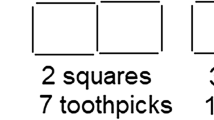Abstract
My purpose in this paper is to show how modelling and othernon-deductive forms of reasoning, as employed by a highly creative mathematician, can be productiveof important conceptual innovations, and, by the same token, can serve as effective tools for stimulatingconceptual development in the process of learning mathematics. After a – necessarily brief – characterizationof Klein's model-based practice and its philosophical underpinning, the educational implications of the `model view'of mathematics are discussed. Models typically establish connections between different parts of our knowledgeand are therefore highly expedient for the construction of anintegrated conceptual framework for understanding mathematics,its relations with science and technology, and its practical uses.
Similar content being viewed by others
References
Boi, L., Flament, D. & Salanskis, J.-M. (eds.): 1992, 1830–1930: A Century of Geometry, Springer-Verlag, Berlin, Heidelberg.
Corfield, D.: 1998, 'Beyond the Methodology of Mathematics Research Programmes', Philosophia Mathematica 6, 272-301.
Corry, L.: 1993, 'Kuhnian Issues, Scientific Revolutions and the History of Mathematics', Studies in History and Philosophy of Science 24, 95-117.
Ernest, P.: 1997, 'The Legacy of Lakatos: Reconceptualising the Philosophy of Mathematics', Philosophia Mathematica 5, 116-134.
Glas, E.: 1993, 'From Form to Function: A Reassessment of Felix Klein's Unified Programme of Mathematical Research, Education and Development', Studies in History and Philosophy of Science 24, 611-631.
Glas, E.: 1998, 'Fallibilism and the Use of History in Mathematics Education', Science & Education 7, 361-379.
Hawkins, T.: 1984, 'The Erlanger Programm of Felix Klein: Reflexions on its Place in the History of Mathematics', Historia Mathematica 11, 442-470.
Keitel, C. (ed.): 1989, Mathematics, Education, and Society, UNESCO, Paris.
Klein, F.: 1871, Ñber die sogenannte Nicht-Euklidische Geometrie, in Klein 1921, pp. 254-305.
Klein, F.: 1872, Vergleichende Betrachtungen über neuere geometrische Forschungen, Deichert, Erlangen.
Klein, F.: 1882, Ñber Riemanns Theorie der algebraischen Funktionen und ihrer Integrale, in Klein 1923, pp. 499-573.
Klein, F.: 1921, Gesammelte mathematische Abhandlungen, Vol. I, Julius Springer, Berlin.
Klein, F.: 1922, Gesammelte mathematische Abhandlungen, Vol. II.
Klein, F.: 1923, Gesammelte mathematische Abhandlungen, Vol. III.
Klein, F.: 1926, Vorlesungen über die Entwicklung der Mathematik im 19. Jahrhundert, Vol. I, Julius Springer, Berlin.
Klein, F.: 1939, Elementary Mathematics from an Advanced Standpoint–Geometry (trans. E.R. Hedrick & C.A. Noble), Dover Publications.
Klein, F. & Riecke, E.: 1904, Neue Beiträge zur Frage des mathematischen und physikalischen Unterrichts an den höheren Schulen, Teubner, Leipzig.
Klein, F. & Schimmack, R.: 1907, Vorträge über den mathematischen Unterricht an den höheren Schulen, Teubner, Leipzig.
Lakatos, I.: 1976, Proofs and Refutations: The Logic of Mathematical Discovery, Cambridge University Press, Cambridge.
Lakatos, I.: 1978 in J. Worrall & G. Currie (eds.), Mathematics, Science and Epistemology: Philosophical Papers, Vol. 2, Cambridge University Press, Cambridge.
Manegold, K.-H.: 1970, Universität, Technische Hochschule und Industrie: Ein Beitrag zur Emanzipation der Technik im 19. Jahrhundert unter besonderer Berücksichtigung der Bestrebungen Felix Kleins, Duncker und Humblot, Berlin.
Mehrtens, H.: 1990, Moderne, Sprache, Mathematik: Eine Geschichte des Streits um die Grundlagen der Disziplin und des Subjekts formaler Systeme, Suhrkamp, Frankfurt.
Pyenson, L.: 1983, Neohumanism and the Persistence of Pure Mathematics in Wilhelmian Germany, American Philosophical Society, Philadelphia.
Rowe, D.E.: 1985, 'Felix Klein's Erlanger Antrittsrede', Historia Mathematica 12, 123-141.
Rowe, D.E.: 1989, 'Klein, Hilbert, and the Göttingen Mathematical Tradition', Osiris 5, 186-213.
Rowe, D.E. & McCleary, J. (eds): 1989, The History of Modern Mathematics, Academic Press, Harcourt Brace Jovanovich Publishers, Boston, etc.
Schubring, G.: 1989, 'Pure and Applied Mathematics in Divergent Institutional Settings: The Role and Impact of Felix Klein', in D.E. Rowe & J. McCleary 1989, Vol.2, pp. 171-207.
Tobies, R.: 1989, 'The Activities of Felix Klein in the Teaching Commission of the Second Chamber of the Prussian Parliament', in Keitel 1989, pp. 50-51.
Tobies, R.: 1989, 'On the Contribution of Mathematical Societies to Promoting Applications of Mathematics in Germany', in Rowe & McCleary 1989, Vol. 2, pp. 223-248.
Author information
Authors and Affiliations
Rights and permissions
About this article
Cite this article
Glas, E. Klein's Model of Mathematical Creativity. Science & Education 11, 95–104 (2002). https://doi.org/10.1023/A:1013075819948
Issue Date:
DOI: https://doi.org/10.1023/A:1013075819948



